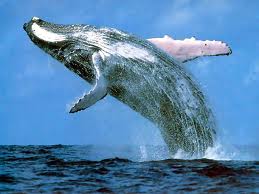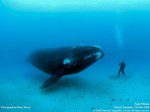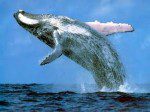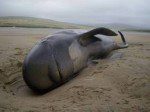
28 Dec EARTH MATTERS: WHALES PLEAD FOR SILENCE
 Since the first primal grunt, humans have heavily relied on communication to survive. We use the art of language to sculpt our society, to stimulate our economy, and to describe the glorious beauty of nature. Without an effective method of communication, chaos would reign and humanity would slowly meander into the abyss as individuals struggle to forage for their next meal.
Since the first primal grunt, humans have heavily relied on communication to survive. We use the art of language to sculpt our society, to stimulate our economy, and to describe the glorious beauty of nature. Without an effective method of communication, chaos would reign and humanity would slowly meander into the abyss as individuals struggle to forage for their next meal.
Similarly, wildlife relies on effective communication to survive.
Scouting ants leave embedded messages in their trail for harvesting ants to locate food resources. California harbor seals bark warnings to their pups when they sense a great white shark in their vicinity. Songbirds in Telluride congregate in tall spruce trees the day before an impending storm and spread the news of the forthcoming change in weather.
As a youth, I was inspired by the Jules Verne tale “20,000 Leagues Under the Sea” and the pictorial stories in National Geographic about mysterious cultures and breathtaking ecosystems. When given the opportunity, I would spend countless hours mesmerized by the majestic flight of a bald eagle or the alternate world beneath the ocean waves. Despairingly, as humanity foolishly pursues a social model based on accommodating growth, anthropogenic noise levels in the natural environment have increased nearly as fast as the price of a loaf of bread. Consequently, many species are having a difficult time communicating above the rising drone of human racket. As a result, noise pollution has disrupted the ability of many species to survive.
 In 1750, prior to the beginning of the industrial revolution, the ocean was full of natural sounds, but otherwise overall a relatively quiet place. Today, after decades of materialistic growth, the ocean depths have become a very noisy place. The constant whine from fleets of motorized vessels crisscrossing the global seas, sonar blasts created by military exercises, and deafening booms from air guns used in oil and gas exploration have created a frightening environment for many marine species.
In 1750, prior to the beginning of the industrial revolution, the ocean was full of natural sounds, but otherwise overall a relatively quiet place. Today, after decades of materialistic growth, the ocean depths have become a very noisy place. The constant whine from fleets of motorized vessels crisscrossing the global seas, sonar blasts created by military exercises, and deafening booms from air guns used in oil and gas exploration have created a frightening environment for many marine species.
In particular, the rising clamor has become extremely dangerous to whales, which depend on the use of sound and their acute hearing to maintain social order and locate food.
Imagine you are in a crowded, noisy coffee shop and attempt to order a skinny latte with whole milk, but the barista behind the counter cannot hear your request and you are unable to hear his response, so in frustration you leave the coffee shop without your precious latte. Likewise, when whales are unable to effectively use sound to forage for food, they end up swimming in circles on an empty stomach. Making matters worse, anthropogenic noise also disrupts a whale’s ability to navigate. Hence, the shockingly increasing number of whales that lose their sense of direction and end up dying a slow, painful death on a dry, sandy beach.
Although I do not claim to know what the whales have to say about all this noise pollution, I would wager they are pleading for silence. On the topside, the National Oceanic and Atmospheric Administration has started to document human-induced noise in the ocean as a means to help mitigate anthropogenic impact in the future.


Sorry, the comment form is closed at this time.